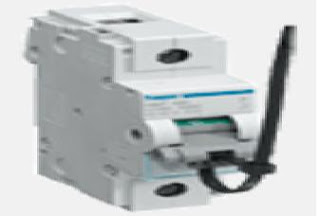 Miniature Circuit Breaker (MCB) is a device designed to protect a circuit's wiring from the serious damage which would be caused if it has to carry a current which is too high for the diameter of its wires. Such a current could easily heat up the wires so much that their insulation melts. If that situation were allowed to develop further it would soon cause the wires in a cable to short out and to burn so hot that they could easily cause a house fire.
Miniature Circuit Breaker (MCB) is a device designed to protect a circuit's wiring from the serious damage which would be caused if it has to carry a current which is too high for the diameter of its wires. Such a current could easily heat up the wires so much that their insulation melts. If that situation were allowed to develop further it would soon cause the wires in a cable to short out and to burn so hot that they could easily cause a house fire.Before circuit breakers were invented, simple wire fuses were used: the wire in the fuses was deliberately made much thinner than the wires in the circuits they were intended to protect. Thus, if a fault condition occured, as the current in the circuit grew higher and higher, a point would be reached at which the thin wire of the fuse would get so hot that it would melt - all safely contained within the body of the fuse - and thus break the flow of current in the circuit it was protecting.
The problem with fuses is that - depending on their design, as some are faster-acting than others - it can take a significantly longer amount of time for them to operate compared with today's very-fast-acting circuit breakers. That fact means that, if a circuit overload current fault condition occurs, considerable damage can still occur both to the circuit wiring and/or to the unit it is supplying with power. Then, after the fault condition has been fixed, the melted or "blown" fuse wire in a rewireable type of fuse has to be replaced or - if it is a "disposable cartridge" fuse - the blown fuse cartridge has to be thrown away and replaced by a new one. A circuit breaker, if it is still in good condition, only needs to be reset.
It is no joke to say if it is still in good condition...! One more fact needs to be mentioned: a significant design feature built into today's circuit breakers is their ability to "self-destruct on a crowbar fault ". A "crowbar fault" is a very serious overload condition, so bad that it would cause many thousands of amps to flow, just as if someone had thrown down a heavy metal crowbar tool onto power lines to connect both hot and neutral wires... Such a fault condition can only be stopped by what is the ultimate fail-safe function of all modern circuit breakers: by using electro-magnetic technology similar to that of a simple relay, they are designed to self-destruct at least as fast as - if not faster than - the fastest acting fuses!
In brief, wherever electrical equipment - and the wiring which supplies it - need to be protected from overload current fault conditions then:
a) if the physical space available allows circuit breakers to be installed, and
b) if the higher initial costs of deploying circuit breakers can be afforded
then it is significantly better to deploy circuit breakers instead of fuses.

The range of multi pole MCB’s from 80A to 125 A are equipped with strong terminals. They present better grip on the cable. In particular, the MCB’s 80, 100 and 125 A are equipped with the 'tightening compensation system'. True Hager innovation, this system compensates for the deformation of the cables related to their ageing and vibration, thus prolonging the effectiveness of initial tightening torque.

This range makes it possible to combine product with RCD add-on-block, simple, fast and secured.
1. Assembly, 2. Connection, 3. Locking
The assembly of the RCD add-on-block is carried out in three steps. Simple and rapid for a secured assembly: it is a Hager innovation.

125A MCB is suitable for residential, commercial and industrial installations with high breaking capacity.Protection of installations is guaranteed by the 10 KA or 15KA breaking capacity defined according to IEC60898-1 and IEC60947-2 standards.

MCB can be locked in the « Off » position by the integrated locking facility on the handle. This lock can be inserted with a 2.5 - 3.5 mm plastic cable tie where you can fit a warning card if necessary and allows a safer working environment for all personnel.
Tidak ada komentar:
Posting Komentar